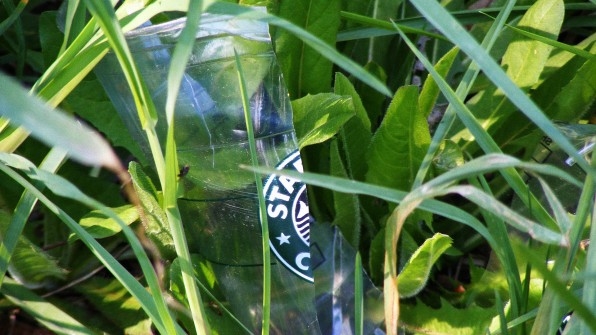Is big business’s new conscience about plastic waste just greenwashing?
Plastic has already taken over our households, our electronics, and even our clothes–and lately it’s taken over the news, too. It seems like everywhere you turn, images of plastic waste crowding oceans and beaches are broadcast while yet another corporation announces a ban on single-use plastic items like straws.
McDonald’s and Starbucks are teaming up to develop a fully compostable coffee cup. Hyatt Hotels, Disney, American Airlines, the Barclays Center and dozens of other major corporations have vowed to phase out offering and using plastic straws. It’s a tremendous movement across industries to combat a collective problem, unprecedented in recent memory. But we’ve been so busy lauding these efforts, we’ve devoted little time to examining the heart of the matter: Will this help? Or is it merely corporate greenwashing and PR spin?
Take Starbucks, for example. The coffee giant is aiming to phase out most single-use plastic straws on iced drinks, replacing them with newly developed… plastic lids. Starbucks insists the new strawless lids are made from polypropylene content that’s widely recyclable, unlike plastic straws. But currently, only around 9% of recyclable plastic is actually recycled. So introducing more single-use options that have a 91% chance of winding up in a landfill or the ocean doesn’t seem like much of a real solution.
And most companies who plan to phase out plastic straws without developing a substitute said nothing of their continued use of plastic utensils, packaging, and other plastic products. Are we being duped?

To fairly evaluate corporations’ response to and responsibilities in the global plastics crisis, it’s instructive to first take stock of how we got here.
It may seem as though we woke up one day this summer suddenly drowning in plastic waste. That’s not completely untrue: Plastic waste has been building up for decades, but until recently, the U.S. shipped most of it half a world away, in China. But on January 1 of this year, China officially stepped down as the world’s landfill and banned the import of other countries’ solid waste: suddenly the plastic we so casually throw away had nowhere to go. This dilemma was exacerbated by our critical lack of waste management infrastructure. We simply do not have the structures in place to deal with the garbage we produce.
The result is that around 275 million metric tons of plastic garbage is created each year, and of that, an estimated 8 million metric tons is dumped into the world’s oceans each year. Over the last 70 years, we’ve produced approximately 8 billion metric tons of plastic that has to go somewhere. Plastic requires hundreds of years to decompose, eventually breaking down into microplastics that live forever, ultimately either in landfills or our oceans.
Any solution, then, must deal with both sides of our plastics problem: What do we do with the plastic waste already littered across the Earth, and how do we responsibly manage what we produce going forward?
Corporate bans on plastic straws touch on only the latter concern. And even then, the vast majority of Starbucks’ new highly recyclable replacement lids are destined for the landfill or the oceans if current statistics hold. So is all this corporate fuss over plastic waste just greenwashing? No.
Of course, moving away from plastic straws won’t clean up our oceans. But it’s a start. The inconvenient truth about plastics is that we quite literally cannot live with them. Earth’s population is expected to top 11 billion by 2100; we cannot hope to feed, house, and clothe that many people without plastic. And that’s not even taking into account our elective reliance on plastics for the conveniences of modern-day living, or the necessity of access to plastic straws for many in the disabled community.
We need corporations to lend their enormous resources and microphones toward efforts to fix the scourge of plastic waste and develop a better plan for plastic consumption going forward. After all, they’re the ones who manufacture and market plastic products in the first place. And they possess the economies of scale–in talent, finance, and platforms–to make a real difference.
We need the business sector on the frontlines of these efforts if we’re going to have any chance of succeeding in saving our planet from plastic. And businesses, well, they need customers. This symbiotic relationship may very represent the path toward solutions. Our new research found a whopping 86% of consumers believe companies should take a stand on social and environmental issues. And 64% of those who felt strongly about that said they were “very likely” to patronize a company or brand based on that activism. The key, data showed, is authenticity and communication.
As consumers stand ready to reward corporate giants like Starbucks and McDonald’s for their verbal commitments and concrete action to phase out plastic, more and more businesses will join in these efforts, and launch new ones, to reap the marketing and fiscal rewards. And the resources that come with that snowball effect give us a real shot at tackling this plastics crisis.
The race to save our planet from drowning in plastic is a marathon, not a sprint, and bans on plastic straws may just be the first leg. But companies are awakening to the fact that investment in Earth can be an investment in their brand, and they’re our best bet for big accomplishments looking ahead.
Suzanne Shelton is president and CEO of Shelton Group, the nation’s leading marketing communications agency focused exclusively on energy and the environment. A copy of Eco Pulse can be downloaded here, and a copy of the Millennial Pulse can be downloaded here.
(48)



